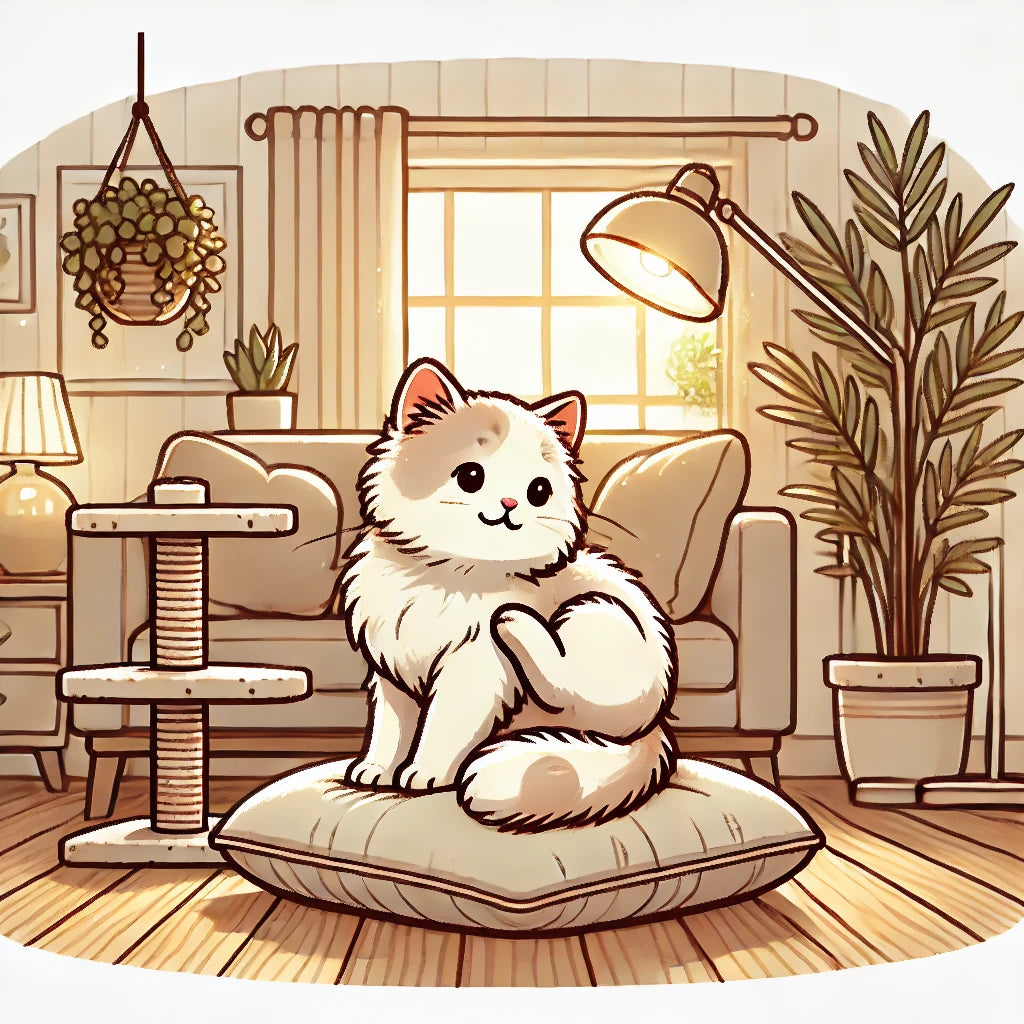
Cat Scratching: Why It Happens and How to Help Your Furry Friend
Share
Cats are amazing companions, but when they start scratching excessively and losing hair, it can leave pet owners puzzled and concerned. This blog will walk you through everything you need to know about cat scratching, why it happens, and how to help your feline friend feel better.
Why Do Cats Scratch and Lose Hair?
Cats scratch and lose hair for various reasons, some more common than others. Identifying the root cause can help you address the issue effectively.
1. Allergies
Cats, like humans, can develop allergies to certain foods, environmental factors (like pollen or dust), or even flea bites. When they have an allergic reaction, their skin becomes itchy, leading to excessive scratching and hair loss.
Symptoms of Allergies in Cats:
- Red, inflamed skin
- Constant licking or scratching
- Hair thinning in specific areas, often the back, tail, or belly
2. Fleas and Parasites
One of the most common causes of cat scratching is fleas. Flea saliva causes an intense itching sensation, prompting cats to scratch persistently. Other parasites like mites or ticks can also cause similar reactions.
How to Spot Fleas or Parasites:
- Tiny black dots (flea dirt) in your cat's fur
- Cats biting or chewing their fur
- Bald patches, especially around the tail base
3. Stress or Anxiety
Cats are sensitive creatures. Changes in their environment, such as moving homes, new pets, or changes in their owner’s routine, can stress them out. Stress can lead to compulsive behaviors like over-grooming, resulting in hair loss.
Signs of Stress in Cats:
- Hiding or avoiding interaction
- Excessive grooming or licking
- Changes in appetite or litter box habits
4. Skin Infections or Conditions
Skin issues, such as fungal infections (like ringworm) or bacterial infections, can lead to itching and hair loss. These conditions often require veterinary diagnosis and treatment.
Symptoms of Skin Infections:
- Circular patches of hair loss
- Scaly or crusty skin
- Open sores or scabs
5. Poor Nutrition
A lack of essential nutrients in your cat’s diet can cause their skin and coat to become unhealthy. Without proper nutrients, their skin becomes dry and itchy, and their hair might fall out.
How to Treat Cat Scratching and Hair Loss
Now that you know the common causes, let’s dive into some actionable steps you can take to help your cat.
1. Check for Fleas and Parasites
Use a fine-toothed flea comb to inspect your cat’s fur. If you find fleas or flea dirt, start flea treatment immediately.
Flea Treatment Options:
- Topical treatments or flea collars
- Regular bathing with cat-friendly flea shampoos
- Clean your home thoroughly, focusing on bedding and carpets, to eliminate fleas
2. Address Allergies
If you suspect allergies, consult your veterinarian to identify the trigger. Once identified:
- For food allergies: Switch to a hypoallergenic diet.
- For environmental allergies: Use air purifiers and keep your cat indoors during peak allergy seasons.
- For flea allergies: Maintain a regular flea prevention routine.
3. Manage Stress
Reducing stress in your cat’s environment can improve their behavior and skin health.
Stress-Reduction Tips:
- Provide a consistent routine for feeding, playtime, and cuddles.
- Create quiet spaces where your cat can relax undisturbed.
- Use calming sprays or diffusers that mimic natural cat pheromones.
4. Improve Their Diet
Feed your cat high-quality food with balanced nutrients. Look for foods rich in omega-3 fatty acids, which promote healthy skin and a shiny coat.
5. Treat Skin Infections
For infections like ringworm or bacterial issues, your vet may prescribe:
- Topical creams or ointments
- Medicated shampoos
- Oral medications
Ensure you follow the prescribed treatment plan diligently to prevent the infection from spreading or recurring.
6. Keep Your Cat Groomed
Regular grooming helps you identify skin issues early and keeps your cat’s coat healthy. Brush your cat weekly to remove loose hair and prevent mats, which can irritate their skin.
When to See a Vet
While minor cases of scratching and hair loss can be managed at home, some situations require immediate veterinary attention:
- Persistent scratching that causes wounds
- Large areas of hair loss
- Changes in appetite, energy levels, or behavior
- Signs of severe pain or discomfort
Final Thoughts
Cat scratching and hair loss can be distressing, but with a little patience and the right approach, you can help your furry friend feel better. From treating fleas to reducing stress and improving their diet, there are plenty of solutions to explore.
Always consult your veterinarian when in doubt, and remember: a healthy, happy cat is a joy to have around!
FAQs
Why does my cat scratch the furniture?
Scratching is a natural behavior for cats to sharpen their claws and mark their territory. Providing scratching posts can redirect this behavior.
How can I stop my cat from scratching me?
Avoid rough play with your cat and keep their nails trimmed. If your cat scratches due to overstimulation, learn their body language to know when they’ve had enough interaction.
Can over-the-counter creams help with cat itching?
No, human creams are not safe for cats. Always consult your veterinarian before applying any treatment to your cat's skin.